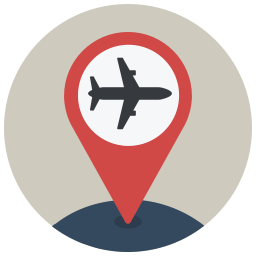One of my greatest fears while flying with my kids, is that one of us (or more than one…) will get sick while we’re traveling. Flying can be quite stressful enough without the added complication of not feeling well.
Sometimes, you might even be getting on a plane knowing you’re not feeling 100%. Is this an ideal situation? Certainly not, but rescheduling a flight can be difficult and expensive. Most people who fly a lot have probably ended up on a plane at some point, when they should have been home in bed.
So how sick is too sick to fly? Well, if you or your child is running a high fever, throwing up, or suffering from diarrhea, you should probably not fly. Same thing if you’re heavily congested: the change in cabin pressure during a flight can make that absolutely excruciating (I did it once, and it was torture). The CDC (The Centers for Disease Control and Prevention) in the US has some information on their website, though they don’t exactly list specifics on when you should or should not fly.
My experience
I’ve traveled on a plane when I was severely congested and running a fever. This was before I had kids and it was terrible. I did not have any decongestants with me on this trip either and was sure my head would explode when the plane went in for landing.
Occasionally we have traveled when my children have had “sniffles”, meaning no fever, no real signs of illness except a runny nose. On these occasions, I make extra sure that I bring some child-decongestants on the trip.
I’ve also traveled with my kids when they’ve had upset stomachs, though in these cases, the stomach-upsets occurred when we were already on the plane. Having a child throw up while in their seat is not a great experience for anyone. This is when a change of clothes, antibacterial wet-wipes, and some anti-nausea medication comes in very handy. Frequent toilet visits because of diarrhea on the plane is also not a lot of fun, and again: antibacterial wet-wipes and a change (or two!) of clothes can be a real life-saver.
As a precaution, I always bring a small bag of “medical items” on board when I fly, and every time I hope I won’t have to use any of the stuff I bring. Usually I haven’t had to use anything, but when it’s needed, it’s really needed.
3 essential items:


1. Decongestants
Don’t fly without this in your carryon, because the ear- and sinus-pain that can occur on a plane if you’re congested is terrible. Make sure you bring something that works for kids as well. Ask your doctor or pharmacist for advice. I personally bring a nose-spray for kids, a small container of Vapo-Rub, and a liquid decongestant for children as well. (Plus an adult decongestant in tablet-form.)
A crazy-sounding tip that actually works: rubbing VapoRub on your feet (so you don’t have to smell it if you’re sensitive to that), and then putting socks on is a great way to relieve sinus pressure and relieve coughing. I wouldn’t have believed it myself, but it has worked for me on several occasions off-plane.


2. Pain- and fever-relief
This is another must-have item for you and your kids. If someone is sick, or gets sick on board, this can really help make your flight bearable. I bring Aspirin for myself, and usually liquid Tylenol for the kids. Again, ask a doctor or pharmacist for advice if you have any worries or questions.


3. Anti-nausea medication
Even if your kids don’t actually have stomach bug, they might feel queasy and get upset stomachs just from being on a plane: anxiety and the changes in pressure, combined with sitting down for a long period of time can do that. I usually bring along some kids’ Gravol on our flights. I’ve had to use it once for my daughter and another time, I let a fellow passenger use it because her daughter was throwing up on a flight. In both cases, I was very glad I had brought it along.
Additional items:
- Any prescription medication you or your child needs (bring prescriptions or doctor’s note with you to avoid any problems in security)
- Allergy medication – if you or your child have allergies, this is also a very necessary item to bring along.
- Bandaids and a small tube of antibiotic or antiseptic ointment for small cuts and injuries





